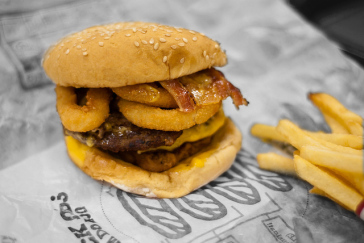 We’ve all been there before, haven’t we? On the go, hungry, with no time to sit down for a proper meal. Some time ago, entrepreneurs realized there was a market for on-the-go food, and we’ve been living in a nation filled with fast food joints ever since.
We’ve all been there before, haven’t we? On the go, hungry, with no time to sit down for a proper meal. Some time ago, entrepreneurs realized there was a market for on-the-go food, and we’ve been living in a nation filled with fast food joints ever since.
Documentaries Super Size Me and Fast Food Nation have opened eyes to the health risks of fast food consumption—obesity, heart disease, and so on. What’s largely ignored are the just-as-scary environmental issues resulting from fast food consumption.
Packaging
Fast food, like too many products for sale, is heavily packaged. Every component of a fast food meal is individually packaged, from the paper wrapping of the sandwich to the one-ounce condiment packets and straw wrapper. There’s also the massive amount of packaging for items used by the restaurants—items come frozen and individually packaged in cardboard boxes, and despite the fact that most of this stuff is recyclable, less than 35 percent of fast food stores’ waste is diverted from landfills. Most of the items trashed by fast food restaurants are paper and plastic, items that can and should be recycled. Unfortunately, the majority of plastic and paper handled by fast food chains is put into the waste stream.
Transportation
Fast food retailers are also guilty of racking up a lot of miles in their transportation and distribution processes. Buying locally produced food is a good way to reduce the carbon footprint of your diet, but this is nearly impossible if you consume a large amount of fast food. The current average of field-to-plate travel distance for a meal is 1,300 miles, due well in part to the fast food industry.
Every truck and ship used to transport fast food products spews CO2 into the environment, and although McDonalds has said they’re “actively pursuing biofuels for transportation vehicles,” the vast majority of fast food transportation fleets run on fossil fuels.
Factory Farms
In order to lower costs and maximize meat production, fast food chains utilize factory farms, large-scale agricultural centers where large numbers of animals are packed into small areas and fed hormones to expedite growth. Aside from the ethical issues involved with factory farming—many animals never see sunlight during their short lives—factory farming creates significant methane emissions and water pollution through excessive fertilization.
The environmental issues with fast food come from the mass-produced nature of the product—chains operate thousands of stores across continents that are always going to look to do things the cheapest way possible. While it may be unfeasible for the average person to cut fast food from his diet completely, our waistlines and our planet would be best served if we used it exclusively as a last resort meal option. Locavorism, the movement of replacing fast food meals with locally grown, sustainable meals is gaining momentum, and it’s in all our best interest to ditch the burger chains whenever possible and jump on board.
Read PBS’ guide to becoming a locavore.
Quality sites
Reblogged this on Time for Action.